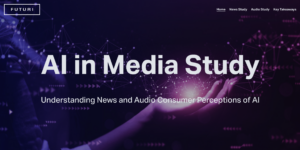By Phi Doan, VP of Marketing, FuturiBooks
Artificial intelligence (AI) is transforming audiobook production, replacing the traditional labor-intensive, manual recording and editing process with one that is faster, less costly, and scalable to a global audience. The tech is essential in streamlining workflows for publishers and producers, automating all stages of production, from pre-production planning, production, and post-production to QA and go-to-market upload.
It’s also opening up new markets. For example, due to reduced production time and speed to market, AI enables faster adaptation of audiobooks for trending topics or niche audiences.
AI audiobook production is hitting the market at a perfect time as demand for portable and accessible reading options continues to climb. Audiobooks globally are soaring, expected to increase to $56 billion by 2032, growing at an enviable CAGR of 26.3% from 2025 to 2032.
Can we meet the demand for the global distribution of audiobooks without AI audiobook production? Maybe, but traditional audiobook production is costly, laborious, and time-consuming. As anyone involved in the process knows, narrators spend hours recording in the studio; depending on the book’s size, hours quickly turn into days. Meanwhile, editors and producers must meticulously comb through the narration, ensuring the accuracy of pronunciations and consistency of tone and energy levels. The narrator’s energy level must be maintained from the first chapter to the last — not an easy feat when speaking for several hours. Mistakes require the narrator to return to the studio to redo the section to be edited into the final version.
At its easiest, without any hiccups, the complete audiobook production process could take weeks; most of the time, it takes several months. With AI audio, that process is accomplished in a few days.
Enhanced storytelling
While emerging AI technologies eliminate these inefficiencies and barriers to market growth, authors are concerned that an AI-produced audiobook will sound robotic. No one wants to listen to an audiobook that sounds like a robot is narrating (unless, perhaps, it’s a dystopian sci-fi novel).
New AI audiobook technology overcomes the robotic intonation we associate with an AI voice. Voice cloning technology captures the narrator’s voice wavelengths, replicating their tone and personality. Voice customization enables AI to adaptively learn and tailor the pacing, tone, and energy level to match the preferences of the listener, author, or publisher to ensure engaged storytelling. Emotion synthesis (emotional speech synthesis or eTTS) further adjusts AI speech to capture the range of human emotion and sound more naturally.
AI audio makes it easy to feature multiple voices in a book simultaneously. If you have numerous characters, each can maintain a distinct voice, allowing them to engage in conversations that listeners can follow seamlessly.
Expanding the global market
AI eliminates the need for multiple recording sessions across different languages, reducing costs for scaling audiobooks globally. The publisher can quickly translate the audiobook into different languages, matching dialects and regional accents and enabling faster and improved international distribution. AI can expand the pool of diverse narrators in audiobooks by allowing a wider range of voices and multiple voices to be used in audiobook production.
Meanings of phrases or words no longer get lost in translation, as AI’s algorithm can comprehend the meaning of a specific language, providing an accurate translation.
Localized versions can be produced simultaneously and at scale, reducing turnaround times and cost. Regions traditionally underserved by the publishing industry benefit from affordable production.
And, because there is a lower entry barrier, the result of faster and less costly production, new and smaller publishers can enter international markets.
Ethical Considerations
There are ethical considerations to keep in mind when using AI for diverse audiobook narration.
These include:
- Consent and authenticity: Disclose voice cloning and AI narration to avoid misunderstandings.
- Job displacement: AI narration may put human narrators at risk.
- Bias in AI models: Developers need to ensure AI systems are trained on diverse datasets to avoid any bias or exclusion of dialects and accents
- Cultural sensitivity: There is a need for oversight that AI voices respect cultural nuances and do not inadvertently stereotype or misrepresent communities.
More Developments to Come
We are at the beginning of AI’s impact on audiobook production and the market.
Like other AI self-learning feedback loops, multi-lingual adaptive learning will continue to learn and, by extension, improve voice naturalness. The more the market for AI audiobooks grows, the better the process gets, as it learns from the previous examples.
Over the next few years, we will see an increase in data-driven decision-making, enabling faster data collection and insights to help strategically target new markets. AI-powered personalization enhances audiobook discoverability, delivering data analytics for understanding user behavior with enhanced metadata tagging. As the AI engine learns user behaviors, enhanced personalization will be able to offer readers narrators or styles that resonate. By opening all talent options globally, we can provide customization that aligns with a story’s character or culture. Providing personalization at a low cost with a faster turnaround will fuel audiobook production.
AI’s impact will extend beyond audiobooks and impact all types of content. As AI-powered voice technology advances, it can seamlessly integrate with other media, including interactive content, augmented reality, and social media platforms. AI-powered audio will be able to narrate news articles, blog posts, and your social media updates in real time, providing users with an audio-first digital experience tailored to their interests.
Additionally, AI will enable cross-platform integration, syncing audiobooks with other media formats. For example, an audiobook could dynamically interact with visual content or provide an immersive experience in virtual and augmented reality environments.
The options are endless.
AI audiobook production is breaking down production barriers, expanding global accessibility, and may contribute to greater inclusivity in audiobook narration. We’re excited to be leading this transformation.
About Phi Doan
Phi Doan is the Vice President of Marketing at Futuri Media, bringing over 20 years of experience driving innovation across SaaS, tech, retail, travel, and QSR industries. A strategic leader in both B2B and B2C marketing, Phi is known for his expertise in demand generation, product marketing, and marketing automation. He has led successful initiatives from startups to global enterprises, championing data-driven strategies, ABM, and digital innovation. With a deep commitment to customer engagement and brand growth, Phi continues to shape the future of marketing through visionary leadership and a relentless pursuit of excellence.







